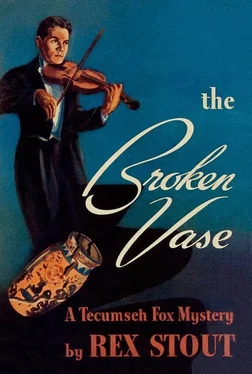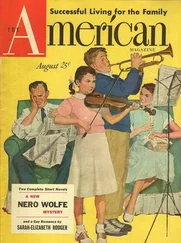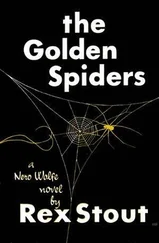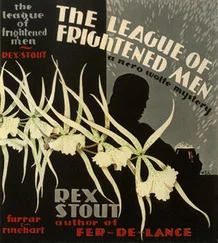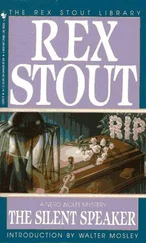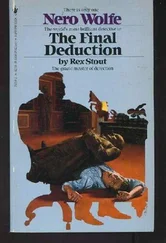“I don’t want to.” Fox sounded disgusted. “Some one with a little sense ought to wade into that. Let’s go out to our seats.”
Diego nodded. “It’s nearly time. Only a minute or two.” His black eyes were aimed across at Jan Tusar, still at the dressing-room door, surrounded by confusion and clamor. “It’s a terrible thing for a boy, that long walk onto that stage, with your fingers hot and moist on the strings — or cold and dry is even worse. Come on, Fox, this way.”
At their seats, on the aisle in the tenth row, orchestra, of the vast auditorium, Diego, after disposing of his hat and coat, stood for a moment to survey the house. It was crowded, with the few remaining seats being rapidly filled by last-minute arrivals, but that, as he well knew, was without significance; any competent manager undertaking a Carnegie Hall debut would know how to provide for that. Besides, there was Mrs. Pomfret, not to mention lesser luminaries busily brightening the path of young artists to fame and fortune. Diego, noting faces here and there, especially in the boxes above, saw that they had done a good job for Jan Tusar.
Or, rather, there had been, not there was, Mrs. Pomfret, for she was not to be seen. Sitting down, Diego murmured to Fox’s ear, “Mystery. Case for you. No Mrs. Pomfret. She always has Box FF, and it’s empty.”
Fox nodded absently and continued to look at his program. Dora Mowbray at the piano. “Introduction and Rondo Capriccioso, Op. 28, Saint-Saens.” “Pastorale and Scherzo, Op. 8, Lalo.” That meant nothing to him. He turned a page. Program notes by Philip Turner. His habit of buying things at odd moments and stuffing them in his pockets might really be better controlled; on the other hand, if he felt like taking a carton of Dixies home to Crocker who would smoke no other brand, why shouldn’t he? He glanced at his watch; it was eight-forty. It was one of Sarasate’s favorite program numbers, and he played it with a sprightliness and charm...
The lights dimmed, a rustle of expectation rippled over the audience and subsided, the door at the left of the stage opened, and a young woman in an apricot-colored gown appeared and walked across to the piano. There were a few scattered handclaps, to which she paid no attention. Her face was so pale that it was no better than a vague blur above the apricot dress, and Fox thought it was ridiculous that no one had had gumption enough to put some make-up on her. He was admiring the neat unity of her brow and nose and chin in profile as she sat motionless on the bench, her head bowed, when the door opened again and a burst of applause greeted the hero of the evening. Jan Tusar walked with stiff but not ungraceful strides to the middle of all that space and a little beyond, bowed to the greeting with no smile, bowed again, waited a moment, and, before the hands had become completely quiet, turned his head for a glance at Dora Mowbray. Her hands moved, a tinkle came, and Tusar raised his violin and tucked its heel into its nest under his chin.
From the corner of his eye Fox saw Diego’s left hand, the one with two fingers gone, taking a convulsive grip on his right wrist, just as Tusar’s bow danced into the opening which, according to the program notes, was “an adorable andante malinconico.”
Nothing happened. That is, nothing exploded. The audience listened politely and quietly, there was only the normal amount of coughing and program rustling, and melodious and harmonious sounds came from the violin and piano. To Tecumseh Fox, who never went to concerts, it seemed not at all unpleasant and even mildly enjoyable; but toward the end he became aware of a feeling of uneasiness. Surely Diego’s breathless unrelenting rigidity was carrying good behavior to an extreme; and what was the little man on the right shaking his head about?
But when the sound from the stage stopped and Tusar stood there erect with his face white and grim and drawn, and the sound from the audience’s hands was manifestly a perfunctory and embarrassed necessity empty of enthusiasm, Fox leaned over to demand of his companion’s ear, “What’s the matter? Did he play the wrong piece?”
Diego shook his head and said nothing, but Fox heard the woman in front of him whispering to her escort, “I don’t understand it. I never heard so dead a tone, and I’ve heard plenty. If he goes on like that it’s a crime not to stop him...”
On the stage Tusar nodded at Dora Mowbray, and the second number began. It sounded to Fox much as it had before, only, after a few minutes, it seemed to him that there was a distinct increase in audible little noises from the audience. He began to feel uncomfortable, and his legs were crossed wrong and had to be changed. The little man at his right was openly fidgeting and let his program fall to the floor. At the end of the Lalo piece the applause was even more perfunctory than before. Fox forwent any glance at Diego; he merely changed legs again, and prayed that the remaining number before the intermission — according to the program, “Obertass” by Wieniawski — would be short. It was. So was the acclaim from the audience, but Tusar’s acknowledgment of it was even shorter. His face set and pale, he stood and stared straight front for one second, then pivoted on his heel and marched off. The audience buzzed and hummed and fluttered. Dora Mowbray, her face even whiter than Tusar’s had been, waited a moment on the piano bench, then jumped up and ran across to the door and was gone.
“Come on, growled Diego, stooping for his hat and coat, and Fox got his own and followed up the aisle. In the lobby Diego growled again, “I’ve got to have a drink,” and, when Fox nodded agreement, led the way outside and down the sidewalk to a bar.
Fox sipped a highball and watched the Spaniard down two double Scotches in succession, judging from the expression on the other’s face that conversation was not in order. For that matter, he was himself somewhat embarrassed and would not have known what to say. A year ago he had, at Diego’s solicitation, contributed two thousand dollars toward the purchase of a violin for a young virtuoso who, according to Diego, was or would be another Sarasate; and he had been brought here this evening to witness a triumph in which he might feel that he had a trifling share. So now he was not only embarrassed; he was somewhat irritated. He hadn’t wanted to come. He knew nothing about music. He had not invited the feeling that he had bought a right to share in another man’s triumph. He continued to sip his highball in silence, while his companion frowned gloomily at the row of bottles back of the bar.
Suddenly Diego turned his head. “You don’t know what happened in there. Do you?”
Fox put his empty glass down and said, “No.”
“Neither do I.”
“I suppose,” said Fox, trying not to sound annoyed, “he was so scared he couldn’t pull himself together. He certainly looked like it.”
Diego shook his head. “No, it wasn’t that. His fingering was all right, even his portamento. I don’t understand it. It was the tone. Dead. Absolutely dead! That fiddle should sing! And he was fighting — his courage was incredible, he fought right up to the end! But did you hear it? It might have been a piece of junk from a pawnshop. I don’t understand it. I feel a little the way I did when this happened.” He displayed the hand with two fingers. “If you’ll excuse me, I’ll walk a while and maybe drink a little. I don’t think I feel like talking.”
“What about Tusar?” Fox demanded.
“I don’t know.”
“Will he try to finish?”
“I don’t know. I tell you I don’t understand it.”
“Neither do I, but I’d like to. I thought it was funk, but you say it wasn’t. Let’s go back and see him. And his violin.”
Читать дальше
